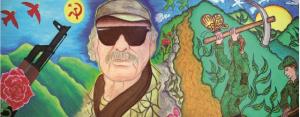The Colombian government and the Marxist guerrillas of the FARC have reportedly reached an agreement on how to deal with drug issues, the third item in a five-part agenda for peace talks that have ongoing in Havana since 2012.

[Update: The FARC and the Colombian government have now released a joint communique outlining the areas of agreement. They include programs for crop substitution, the end of aerial eradication--although the government maintains the ability to undertake it in extreme circumstances--a national drug use prevention education program, a national drug rehabilitation program, and Colombia challenging current drug control policies in international forums like the United Nations.]
The FARC has been at war with the Colombian state for half a century. Flush with profits from the coca and cocaine trade, it surged in the 1990s, but was beaten back by a vicious counterinsurgency led by the government of former President Alvaro Uribe and backed by billions of dollars in US anti-drug, and later, anti-terrorism assistance. Also aligned with the Colombian state were rightist paramilitary organizations involved in the drug traffic.
The government of President Juan Santos has attempted to end the seemingly perpetual conflict by engaging in the peace talks. Santos is up for reelection later this month against a hard-line Uribe ally, Oscar Ivan Zuluaga, whose position is that the FARC must agree to lay down its weapons before engaging in peace talks. This apparent progress in the slow-moving talks could help Santos when voters go to the polls on May 25.
While the FARC has refused a cease-fire while talks are ongoing, on Friday it also announced that it would temporarily cease operations in the days just before and after the election.
The FARC had entered this phase of the negotiations with a 10-point program on the drug issue, including special protections for coca producers, alternative development programs, development of licit uses for coca, poppy, and marijuana crops, an end to aerial fumigation of drug crops, and an to militarized drug law enforcement, decriminalization of drug producers, workers, and consumers, and recognition of problematic drug use as a public health, not a criminal justice problem.
This work by StoptheDrugWar.org is licensed under Creative Commons Attribution-ShareAlike 4.0 International
Add new comment